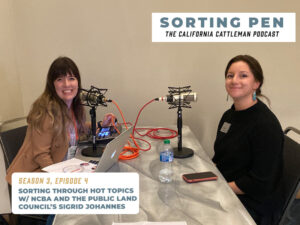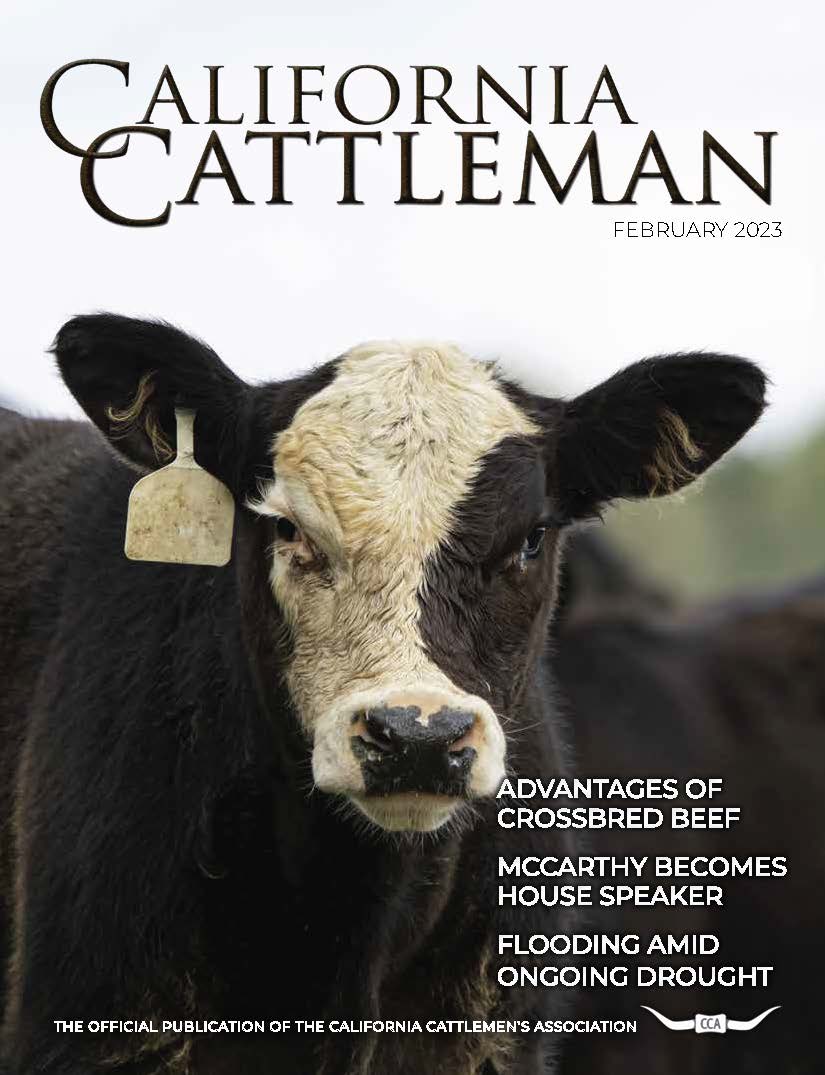
LEGISLATIVE BULLETIN
February 21, 2023
To read the full version each week, please subscribe below.
Newsom Issues Executive Order to Protect Water Supply
Early last week, Governor Gavin Newsom issued an executive order intended “to extend available [water] supplies, protect water reserves, and maintain critical flows for fish and wildlife.”
Perhaps the most significant provision of the Executive Order directs the State Water Resources Control Board (SWRCB) to “consider modifying requirements for reservoir releases or diversion limitations in Central Valley Project or State Water Project facilities to,” among other purposes, “provide opportunities to maintain or to expand water supplies north and south of the Delta.” This provision enables the SWRCB to waive certain water quality standards in the Sacramento-San Joaquin Delta (intended to protect fish species such as Chinook salmon and Delta smelt) to improve reservoir levels and increase pumping to Southern California agricultural producers and cities. To enable the SWRCB’s modification, the Executive Order invokes the Governor’s emergency powers to suspend provisions of the Water Code and Public Resources Code relating to state actions which may impact water quality.
Shortly after Governor Newsom’s Executive Order was issued, the California Department of Water Resources and the U.S. Bureau of Reclamation jointly filed a Temporary Urgency Change Petition with the SWRCB “to ensure the availability of an adequate water supply” for the Central Valley Project and State Water Project, citing the authority granted to the SWRCB under the Executive Order. The SWRCB is expected to act on the petition this week.
Newsom’s order also renews a term from a prior March 28, 2022 Executive Order which prohibits local agencies from issuing permits for new groundwater wells or for alterations to existing groundwater wells in medium- and high-priority groundwater basins unless the agency finds that the well would not be inconsistent with sustainable groundwater management and would not negatively impact adjacent wells or infrastructure.
Finally, the Executive Order directs state agencies to facilitate groundwater recharge projects and to streamline permitting for such projects, and to provide recommendations for “ongoing emergency drought response” to the Governor by April 28. Ahead of that date, CCA will encourage state agencies to recognize the benefits that ranching practices – including the development of livestock stock ponds – can have for groundwater recharge and drought resiliency.
FSA Accepting ECP Applications to Restore Damage from Severe Winter Storms
USDA’s Farm Service Agency (FSA) has announced that it will accept applications through April 14 for Emergency Conservation Program (ECP) funds to address damages “to eligible farmland, fences, and conservation structures” caused by the series of severe atmospheric rivers which hit the state from late December to mid-January. Producers in 41 California counties are eligible for ECP funds. For more information, see last week’s edition of Legislative Bulletin.
USDA Designates Stanislaus Co. a Primary Natural Disaster Area Due to Excessive Heat
Earlier this month the U.S. Department of Agriculture designated Stanislaus County as a primary natural disaster area due to “Excessively high temperatures that occurred from September 1, 2022, through September 9, 2022.” Ranchers in Stanislaus County and bordering counties may be eligible for assistance from the Farm Service Agency (FSA), including FSA emergency loans which can be used for purposes such as replacing equipment or livestock. The application deadline is September 13, 2023; for more information see last week’s edition of Legislative Bulletin.
SWRCB Again Extends Curtailment Suspensions Within Scott River Watershed
On Friday, the State Water Resources Control Board announced that curtailments in the Scott River watershed remain suspended through midnight next Monday, February 27, so long as flows of 200 cubic feet per second (cfs) are maintained at the Fort Jones gage (if flows dip below 200 cfs, diversion under all water rights listed here must immediately cease).
Otherwise, water rights curtailment suspensions and conditional curtailments remain unchanged from the statuses reported in the January 30 edition of Legislative Bulletin.
New Episode of Sorting Pen: The California Cattleman Podcast
On this week’s episode of Sorting Pen: The California Cattleman Podcast Katie caught up with the Public Land Council and NCBA’s Natural Resources Associate Director Sigrid Johannes during the 2023 Cattle Industry Convention earlier this month for a conversation on what the groups are working on in D.C. on behalf of California ranchers on both public and private lands. Hear about the two regulatory lawsuits NCBA recently filed in January against the Biden Administration and more in this episode. Click here to listen.
Rancher Technical Assistance Program Hosts Flood Assistance Webinar
The Rancher Technical Assistance Program hosted a Flood Assistance Webinar for ranchers and producers who may have been impacted by recent storms.
Navdeep Dhillon, the Farm Program Chief for USDA, Farm Service Agency in California provided and overview about the different programs available. These programs include:
- Emergency Conservation Program (ECP) used for disaster recovery. The sign up for ECP opens on Mon. Feb. 13 and is due April 14, 2023.
- Livestock Indemnity Program (LIP) available to livestock producers. Proof of mortality is required to qualify for assistance and notice of loss must be filed within 30 days of the event.
- Emergency Assistance for Livestock, Honeybees and Farm-Raised Fish Program (ELAP) details can be found on this factsheet.
- Tree Assistance Program (TAP) to replant or for vines destroyed or damaged by flooding. The Deadline to sign up is within 90 days of when loss becomes apparent.
Emergency low interest loans are available to those with a loss in access of 30%. The deadline to sign up must be within eight months of the disaster.
To view the webinar, click here. For further information on loan assistance programs click here. RTAP is a joint project developed by the California Cattlemen’s Foundation and Western Resource Strategies, LLC and funded by the California Cattle Council.
Small Business Administration Disaster Loans Available for Six Counties
Agricultural businesses in San Mateo, Santa Cruz, Monterey, San Luis Obispo, Santa Barbara and Ventura counties impacted by recent winter storms and floods that began on Dec. 27, 2022, are eligible to apply for long-term, low interest direct federal loans from the U.S. Small Business Administration (SBA).
For further information on these loans click here.
Although the Economic Injury Deadline isn’t until Oct. 16, 2023, SBA advises submitting applications as soon as possible.
For further information on this funding click here.
Upcoming CCA Events
Feeder Meeting
May 24 – 26, San Diego, CA, Marriott Marquis
Early bird registration for the California Cattlemen’s Association Feeder Council and Arizona Cattle Feeders Association Meeting is now open. Register by 3/6 to attend at the best price. Prices will increase 3/7. To Register click here.
The CCA room block is not yet open for reservations. Watch in the coming weeks for a link and full details on booking in the block to be sent out and posted on the event page of our website.
Upcoming Industry Events
Ag Legacy Symposium
Feb. 25, 2023, Chico, CA, In Person
The University of California Cooperative Extension Plumas-Sierra is hosting an Ag Legacy Symposium on Saturday, Feb. 25 at the Chico State University Farm. The event will prepare your farm or ranch or agri-business, big or small, for the transition to the next generation. The sessions will cover legal aspects, financial topics, political factors, family dynamics, and provide real life scenarios for you to consider incorporating into your succession plan. Early bird registration is $30 and includes morning refreshments, lunch and workshop materials. To register, click here.
If your business is interested in joining as a sponsor or trade show vendor, please contact Dr. Kasey DeAtley at kdeatley@csuchico.edu or 530-828-4318. For general event questions please contact Tracy Schohr at tkschohr@ucdavis.edu or 916-716-2643.
UCCE Offers AB 589 Water Measurement and Reporting Course
March 2, Davis, CA
The University of California Cooperative Extension (UCCE) will offer a water measurement and reporting course, as authorized by CCA-sponsored AB 589 (2017) and SB 880 (2022), on Thurs., March 2. There will be a limited number of trainings offered in 2023, so early registration is encouraged. Registration is $30; for further details and to register for the training, click here or contact Larry Forero.
UC Davis Bovine Artificial Insemination Clinic
March 27-29, 2023, Davis, CA, In Person
The UC Davis Young Cattlemen’s Association will host a Bovine Artificial Insemination Clinic March 27-29 at the UC Davis Feedlot and Beef Barn. Veterinarians from the UC Davis School of Medicine will teach the clinic. The cost for non YCA members is $425 and $375 for YCA Members. For more information and to register contact Davisyoungcattlemens@gmail.com.
Industry News
USDA Announces Conservation Reserve Program Signup for 2023 USDA Farm Service Agency “Agriculture Secretary Tom Vilsack announced that agricultural producers and private landowners can begin applying for the Conservation Reserve Program (CRP) General signup starting February 27 through April 7, 2023. CRP is a cornerstone voluntary conservation program offered by the U.S. Department of Agriculture (USDA) and a key tool in the Biden-Harris administration’s effort to address climate change and help agricultural communities invest in the long-term well-being of their land and natural resources.” To continue reading, click here.
California’s snowpack is melting faster than ever before, leaving less available water Los Angeles Times “For decades, Californians have depended on the reliable appearance of spring and summer snowmelt to provide nearly a third of the state’s supply of water. But as the state gets drier, and as wildfires climb to ever-higher elevations, that precious snow is melting faster and earlier than in years past — even in the middle of winter.” To continue reading, click here.
Storms renew Point Reyes ranching water contamination concerns Marin Independent Journal “Park officials said inspections at the two ranches — Kehoe Ranch and B Ranch — found that the runoff was not pure liquid manure as some visitors had suggested. Melanie Gunn, a park official, said the runoff from the ranches included residue from feed areas, mud and general agricultural runoff that might contain dispersed manure.” To continue reading, click here.
Ranchers warn against scam artists who try to prey on livestock producers Capital Press “In the last couple of months, ranchers Don and Anthony Santos of Glide, Ore., Bob Buchanan of Klamath Falls, Ore., and Veril Nelson of Sutherlin, Ore., have been contacted via text messages about the possible purchase of bulls, cows or heifers. They recognized red flags fairly early in the text negotiations, didn’t continue the communications and did not fall for the scams.” To continue reading, click here.
Newsom suspends environmental laws to store more Delta Water CAL MATTERS “Facing an onslaught of criticism that water was “wasted” during January storms, Gov. Gavin Newsom on Monday suspended environmental laws to give the go-ahead to state officials to hold more water in reservoirs.” To continue reading, click here.
A New episode of Sorting Pen: The California Cattleman Podcast is out now. While at the 2023 Cattle Industry Convention earlier this month Katie sat down with the Public Land Council and NCBA’s Natural Resources Associate Director Sigrid Johannes to discuss what the groups are working on in D.C. on behalf of California ranchers on both public and private lands. Hear about the two regulatory lawsuits NCBA recently filed in January against the Biden Administration and more in this episode. To listen to the episode click here.



